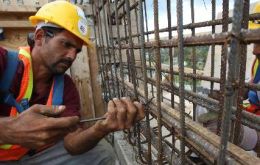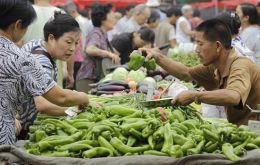MercoPress. South Atlantic News Agency
Economy
-
Monday, November 22nd 2010 - 04:09 UTC
EU and the US pledge to reach a deal on the Doha trade negotiations next year

European Union leaders and President Barack Obama over the weekend made a point of stressing EU/US close ties after a low-key summit in Lisbon ended with a pledge to push for a deal in the Doha trade negotiation next year.
-
Sunday, November 21st 2010 - 23:49 UTC
International visitors sustainedly flocking to the US: 40.2 million in eight months

The United States Department of Commerce says the number of international visitors to the country is rising fast.
-
Saturday, November 20th 2010 - 04:58 UTC
Tourism industry generates 9% of global GDP and 8% of world employment

The travel and tourism industry is one of the largest and most dynamic industries in today’s global economy expected to generate about 9% of total GDP and provide for more than 235 million jobs in 2010 representing 8% of global employment.
-
Saturday, November 20th 2010 - 03:15 UTC
Argentine economic activity expands strongly in September but at slower pace

Argentina's economy activity expanded strongly in September but at a slower pace than in previous months, according to a Friday release from the country’s Statistics Office, Indec.
-
Saturday, November 20th 2010 - 02:37 UTC
CFK ratifies economic model based on defence of Argentine production and jobs

President Cristina Fernández de Kirchner (CFK) ratified the current economic development model with strong government intervention and supported her position with the latest data on unemployment and growth.
-
Saturday, November 20th 2010 - 02:30 UTC
Bernanke warns about two-speed recovery which could end in slow growth for all

The United States central bank chairman Ben Bernanke has criticised countries like China that run large trade surpluses. He said that by buying dollars, these countries were hurting the US recovery and the global economy with it.
-
Friday, November 19th 2010 - 18:07 UTC
China imposes second banks’ reserve hike in two weeks

China's central bank has raised the amount of money that lenders must keep in reserve, as it moves again to try to control the country's high inflation. The People's Bank of China said the reserve ratio would go up by a further 0.5 percentage points on 29 November.
-
Friday, November 19th 2010 - 16:01 UTC
Brazilian central bank chief steps down from president-elect Rousseff’s team

Brazilian central bank president Henrique Meirelles will not accept any invitation to remain as head of the bank unless president-elect Dilma Rousseff gives him full guarantees of “absolute autonomy” in running the institution. He also rejects the idea of holding on the job during the first quarter of 2011 until a definitive successor is named.
-
Friday, November 19th 2010 - 05:11 UTC
Venezuelan economy recovering but“15% devaluation” expected in 2011

Venezuela may formally devalue its currency “at least” 15% in early 2011, Barclays Capital said in a report sent via e-mail, changing its position after meetings with Finance Ministry and central bank officials in Caracas.
-
Friday, November 19th 2010 - 05:01 UTC
UK inflation rises to 3.2% in October pushed by higher fuel prices

The UK Consumer Prices Index (CPI) inflation rate rose unexpectedly to 3.2% in October, official figures show, on the back of higher fuel prices. Analysts had expected the CPI figure to remain unchanged at 3.1%.
